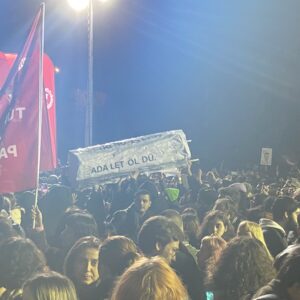RS21, the organ of the group bearing the same name (Revolutionary Socialism 21) – which resulted from a crisis that affected the Socialist Workers Party (SWP) in Britain – published a review by Charlie Hore of my latest book, The New Cold War: The United States, Russia and China, from Kosovo to Ukraine. Unfortunately, the review is based on a rather shallow reading of the book as if the reviewer had only skimmed it through. It is moreover ridden with the kind of quibbling that is alas characteristic of much of the radical left.
This transpires early on when the reviewer writes that I “claim” to have “first coined the term [New Cold War] to describe the confrontation between NATO and Russia over Kosovo”. My essays of 1998 and 1999 in which I described the continuation of the US “cold war” attitude, assessing the Kosovo war in the second essay as the final trigger of a New Cold War that opposes the US and its allies, on the one hand, to the alliance between Russia and China on the other, are reproduced in the book. They constitute its first part indeed, after a substantial introductory chapter on the concept of “cold war” and its history. On page 2 of this Introduction, I explain that the first to have called the new stage of global relations “a new cold war” is George Kennan, the famous architect of the previous Cold War. I therefore do not “claim” to have “first coined the term”: what I can claim, I believe, is that I first described the contours of this New Cold War. It is actually Noam Chomsky who asserts, in his endorsement of the book, that I am “the scholar who first identified and studied it”.
A few lines later, the reviewer writes that “the wars in Afghanistan and Iraq … get surprisingly little mention (Iraq isn’t even in the index)”. This is another indication that Hore hasn’t read the book thoroughly. The very fact that the index, given by him as a proof, shows that Afghanistan is mentioned on several pages (7, 9–10, 36, 52, 99, 109, 133, 154, 157, 162, 188, 193–4, 231, 239, 258, 263, 271–3, 290–2), this very fact alone should have been enough to warn him that Iraq’s absence from the index is but a failure (I complained about the index’s poor quality to the publisher, but it was too late to change it). Using the Find function on my book’s pdf, I can reassure the reviewer that Iraq is mentioned no less than 70 times in my book!
China
The only chapter that the reviewer did read thoroughly is Chapter 4 on China. That is because Hore has been for many years “writing a book about China”, or so I learned from the bio notice that I found when I searched for his name. He reproaches me for “echoing” Walden Bello’s view that the jury is still out on whether China is yet an imperialist power. I referred to Bello indeed, after describing China’s launch of the Belt and Road Initiative (BRI) and of what became the Asian Infrastructure Investment Bank (AIIB). I then commented: “As to whether such initiatives indicate that China’s mutation into one more imperialist power in the economic definition of the term, similar to the others, is complete or not, “the jury is still out”, as Walden Bello remarked in a nuanced booklet.” (p. 263).
To this, the reviewer replies by pointing to the fact that “China is not only the second-largest economy in the world, but also the largest exporter and second-largest importer, as well as the second-largest exporter of capital”. The classics (Lenin, etc.) are then invoked to assert that: “If China could become a major capitalist power fully integrated into the world economy without becoming imperialist, that poses the question of whether there is any necessary relationship between capitalism and imperialism – a question that Achcar does not address.” Having seemingly not read my chapter on Putin’s Russia, Hore must have overlooked my discussion of imperialism in the economic definition that it contains.
I also devoted several pages to discuss the nature of the Chinese economy, which I described as “bureaucratic capitalism” following in this my friend and comrade Au Loong-Yu. It is precisely the reason for my agnosticism about whether China can be described as “one more imperialist power in the economic definition of the term, similar to the others”. This is because I subscribe to the classical definition of imperialism as implying the rule of a “financial oligarchy” (Lenin). And here is the point where the reviewer necessarily differs with me, since he belongs to a tradition that saw the Soviet Union itself as both state-capitalist and imperialist. I disagree with that perspective: the USSR’s behaviour on the global scene was not determined by financial interests, in my view, but essentially by geopolitical concerns dictated by the consolidation of bureaucratic rule. From that perspective, the USSR was certainly an imperial power, but it wasn’t an “imperialist” one in the classical definition of “imperialism” as a distinct stage of capitalism.
Conflicting assessments
I am yet to be convinced that the logic of China’s behaviour on the global scene is determined by financial interests and capitalist profits, not by the geopolitical concerns of the Chinese bureaucracy, which are not one and the same. There are conflicting assessments of China’s relations with countries of Africa, Asia and Latin America. I modestly do not pretend that I have studied them enough in order to make a definitive judgement on whether China falls in the imperialist category or not. Such a classification also implies political consequences that I am wary of and don’t take lightly. Hence, my agnosticism.
Hore also objects to my assessment of the US military expansion around China by asserting that: “Although the US military presence in east Asia is expanding, it remains much smaller than at the time of the Korean or Vietnamese wars.” This is exactly like saying that, although the US military presence in the world is expanding, it remains much smaller than at the time of the Second World War – in other words, it is an absurd argument. The United States has been lately very busy in expanding its set of alliances in securing a military vice around China, as described in details in the book. “The problem here”, according to the reviewer, “is that to understand why the USA is having some success in returning to southeast Asia it’s necessary to understand the increasing antagonisms between China and all of its neighbours, driven primarily by China’s claims to control over areas of the South China Sea hundreds of miles from its shores.” Well, these claims, which are not new, are described in the book’s first part (pp. 62-66) and were probably overlooked by the reviewer.
The review’s last section objects to my designation of the global relations since the turn of the century as a New Cold War. Hore writes: “This is primarily because [Achcar’s] definition focuses on military confrontation, and the return of what he calls the ‘permanent war economy’. But the world today has changed out of all recognition since the classic John le Carré-era Cold War, where the world was essentially divided into two opposing blocs whose competition was primarily expressed in military terms”, whereas today “economic, political and military competition between great powers are once again entwined”. Hence, for Hore, it seems “more useful to see the present as a new phase of imperialism, in which the pre-1914 world is as useful a reference point as the Cold War”.
First of all, “the permanent war economy” is a concept elaborated by a US Marxist economist in 1944, as I explain in the introductory chapter (p. 22), not a label that is specific to me as could be understood from the way it is presented by the reviewer. Secondly, I described the continuation of this permanent war economy in the US, not its “return”. Thirdly, it must have escaped Hore’s attention once again that I explained in my introduction (pp. 17-18) that the notion of “cold war” was coined by Eduard Bernstein in reference to the pre-1914 world. There is therefore no point in objecting this reference to me.
Hore’s conclusion is that “The New Cold War provides a detailed account of the military side of these developments, at least between the USA and Russia, but its relative neglect of the economic dimension means that it falls short of providing the rounded analysis that we need to oppose imperialism today”. This is very reductive indeed as my book deals with much more than “the military side” as any reader may find out. And nowhere did I make the pretentious claim that I have provided in my book “the rounded analysis that we need to oppose imperialism today”. I hope though to have contributed to this necessarily collective endeavour.
Art (52) Book Review (121) Books (114) Capitalism (65) China (79) Climate Emergency (97) Conservative Government (90) Conservative Party (45) COVID-19 (44) Economics (39) EcoSocialism (55) Elections (82) Europe (44) Fascism (56) Film (49) Film Review (68) France (69) Gaza (59) Imperialism (97) Israel (119) Italy (45) Keir Starmer (52) Labour Party (110) Long Read (42) Marxism (47) Palestine (163) pandemic (78) Protest (149) Russia (334) Solidarity (133) Statement (48) Trade Unionism (134) Ukraine (339) United States of America (130) War (362)
Latest Articles
- The boys are not alrightSimon Pearson points out that a Minister for Men cannot rebuild the infrastructures of solidarity that were torn apart by decades of neoliberal consensus.
- Yemen on the brinkNow that Trump has returned to the White House with far greater arrogance than during his first term, the possibility of re-escalating the war in Yemen with direct US involvement has become very real, argues Gilbert Achcar
- Labour austerity – balancing the books on the backs of the poorestDave Kellaway on Labour attacks on disabled people
- Turkey: a mass movement builds against Erdogan’s power grabUraz Aydin answers questions from Antoine Larrache about the mobilization currently building in Turkey after the arrest of the mayor of Istanbul, who is seen as Erdogan’s main rival in the race for the next presidential election.
- Socialist Health Association react to the abolition of NHS EnglandEsther Giles explains why the removal of NHS England is a necessary but not sufficient step to the NHS we need






